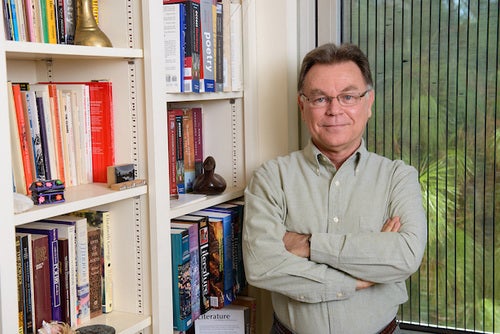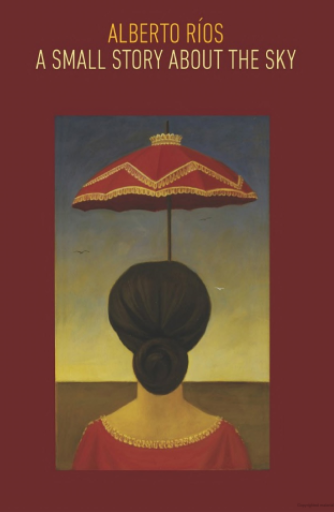Year in review: ASU professor's 'Border' poem part of U2 tour

ASU Professor Alberto Rios' poem, shown here in a screenshot, is part of the pre-show of U2's current world tour.
Editor's note: This story is being highlighted in ASU Now's year in review. To read more top stories from 2017, click here.
Arizona State University’s Department of English is feeling a little pride in the name of Alberto Rios: the Regents' Professor's work is part of U2’s Joshua Tree Tour 2017.
Rios’ poem “The Border: A Double Sonnet” is being projected on giant video screens during pre-show segments of the Irish rock band’s current world tour. Rios, who is also Arizona's first poet laureate, said he first got wind that his poem was opening for U2 when his son forwarded a screenshot of an image that a friend captured at one of the band’s recent shows in Los Angeles.
“I confess I didn’t think too much of it, except that it seemed like a kind of fluke,” Rios said. “Then, about a week later, I got an excited call from my editor who said they had just signed a licensing agreement with U2. He said that I would probably see a few dollars — it’s never much in poetry, of course — and I said, ‘Oh, no. There goes my pro-Bono joke!’” — a reference to the band’s lead singer Bono.
Marking the 30th anniversary of the band’s 1987 America-themed concept album “The Joshua Tree,” U2 launched its world tour in mid-May in Vancouver, British Columbia.

Alberto Rios
The original Joshua Tree Tour, interestingly, started and ended at ASU. The trek kicked off April 2, 1987, at ASU University Activity Center (now Wells Fargo Arena) and closed Dec. 20 that year at Sun Devil Stadium.
Rios was in his fifth year of teaching at ASU when U2 launched its 1987 tour. Thirty years later his “Border” poem is now part of the band’s multimedia tour production. The piece is featured in Rios’ most recent book, “A Small Story About the Sky.” He describes the poem as “simply 28 ways of looking at the border wall that don’t get reported in the news.”
“I think of each line as a small poem in and of itself,” Rios said. “That the lines can join together and make something greater strikes me as worthy.”
That’s a concept Rios says he also likes to share with his students in the classroom at ASU. He encourages them to work from choice, not from habit, emphasizing that poetry and writing in general is a craft that takes some work to master.
He should know. Rios has written 10 books, several chapbooks of poetry, three collections of short stories and a memoir. He is wrapping up a new book of poems and has submitted two long works of fiction for publication review.
In addition to Rios’ “Border,” U2’s tour also includes the poem “Wingfoot Lake” from Pulitzer Prize winner and former U.S. Poet Laureate Rita Dove, who also has ties to ASU. Dove taught creative writing at ASU from 1981 to 1989. She is now a Commonwealth Professor at the University of Virginia.
While Rios has worked with musicians over the years, he has yet to meet any members of U2. He said he wouldn’t hesitate for one second if given the opportunity to share the stage with the band.
As to whether he has any favorite songs by the venerable Irish rockers, Rios said, “Since they used the poem, my favorite U2 song is, um ... every one of them.”
More Arts, humanities and education

ASU graduate education programs are again ranked among best
Arizona State University’s Mary Lou Fulton College for Teaching and Learning Innovation continues to be one of the best…
ASU FIDM students to see their designs on the runway at Uncertainty Fashion Showcase
Nola Hill is perfecting every stitch of her fashion design collection, which she started conceptualizing last summer.She is among…

ASU+GSV Summit brings experts together to discuss innovation in education
This week, Arizona State University President Michael Crow and other university leadership joined education and learning experts…


